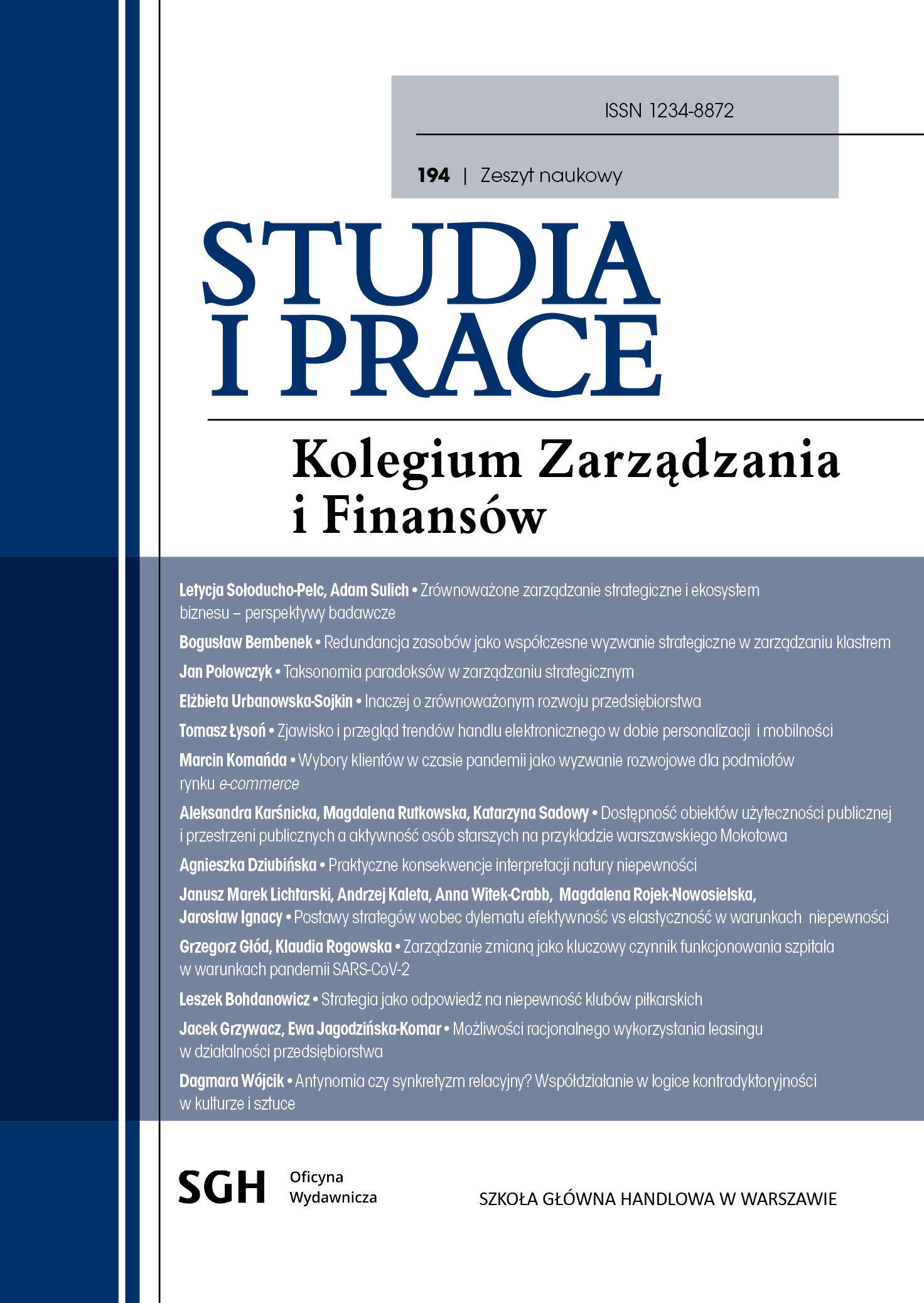Postawy strategów wobec dylematu efektywność vs elastyczność w warunkach niepewności
DOI:
https://doi.org/10.33119/SIP.2023.194.9Słowa kluczowe:
niepewność otoczenia, zarządzanie strategiczneAbstrakt
Celem opracowania jest identyfikacja postaw strategów wobec dylematu związanego z dążeniem do efektywności vs elastyczności w warunkach niepewności. W przeprowadzonym badaniu zastosowano podejście jakościowe z wykorzystaniem pogłębionych wywiadów ze strategami (n = 18). Wyniki pokazały, że w warunkach niepewności różnie kształtuje się sposób postrzegania badanego dylematu. Obok postaw skierowanych na optymalizację (efektywność) lub rezerwy zasobowe (elastyczność) ujawniają się również zachowania defensywne i ofensywne, tworząc tym samym macierz postaw wobec badanego dylematu.
Downloads
Bibliografia
Wydawnictwa zwarte
Creswell, J. (2014). Research Design: Qualitative, Quantitative, and Mixed Methods Approaches. Thousand Oaks: Sage.
Eriksson, P., Kovalainen, A. (2016). Qualitative Methods in Business Research (2nd ed.). Los Angeles: Sage.
Gerring, J. (2007). Case Study Research. Principles and Practices. New York: Cambridge University Press.
Knight, F. H. (1921). Risk, Uncertainty and Profit. Boston–New York: Houghton Mifflin Company.
Krupski, R. (red.). (2005). Zarządzanie przedsiębiorstwem w turbulentnym otoczeniu. Ku superelastycznej organizacji. Warszawa: PWE.
Schomberg, von R. (1993). Controversies and Political Decision Making. Dordrecht: Kluwer Academic Publishers.
Wit, de B., Meyer, R. (2007). Synteza strategii. Tworzenie przewagi konkurencyjnej poprzez analizowanie paradoksów. Warszawa: PWE.
Artykuły naukowe
Adler, P. S., Goldoftas, B., Levine, D. (1999). Flexibility versus Efficiency? A Case Study of Model Changeovers in the Toyota Production System, Organization Science, 10, s. 43–68.
Combe, I. A., Rudd, J. M., Leeflang, P. S. H., Greenley, G. E. (2012). Antecedents to Strategic Flexibility, European Journal of Marketing, 46 (10), s. 1320–1339.
Das, T. K., Elango, B. (1995). Managing Strategic Flexibility: Key to Effective Performance, Journal of General Management, 20 (3), s. 60–74.
Duncan, R. B. (1972). Characteristics of Organizational Environments and Perceived Environmental Uncertainty, Administrative Science Quarterly, 17, s. 313–327.
Eisenhardt, K. M., Martin, J. A. (2000). Dynamic Capabilities: What Are They?, Strategic Management Journal, 21 (10/11), s. 1105–1121.
Giones, F., Brem, A., Berger, A. (2019). Strategic Decisions in Turbulent Times: Lessons from the Energy Industry, Business Horizons, 62, s. 215–225.
Grewal, R., Tansuhaj, P. (2001). Building Organizational Capabilities for Managing Economic Crisis: The Role of Market Orientation and Strategic Flexibility, Journal of Marketing, 65 (2), s. 67–80.
Hitt, M. A., Ireland, R. D., Sirmon, D. G., Trahms, C. A. (2011). Strategic Entrepreneurship: Creating Value for Individuals, Organizations, and Society, Academy of Management Perspectives, 25 (2), s. 57–75.
Jauch, L. R., Kraft, K. L. (1986). Strategic Management of Uncertainty, Academy of Management Review, 11, s. 777–790.
Karhu, P., Ritala, P. (2020). The Multiple Faces of Tension: Dualities in Decision-Making, Review of Managerial Science, 14 (3), s. 485–518.
Krupski, R. (2004). Redefiniowanie strategii organizacji, Prace Naukowe Akademii Ekonomicznej we Wrocławiu, 1045, s. 82–83.
Lewis, R., Sutton, N., Brown, D. (2023). How Senior Managers Use Interactive Control to Manage Strategic Uncertainties: An Attention-Based View, Management Accounting Research, July.
Magnani, G., Zucchella, A. (2019). Coping with Uncertainty in the Internationalisation Strategy. An Exploratory Study on Entrepreneurial Firms, International Marketing Review, 36 (1), s. 131–163.
Mahnke, V., Venzin, M., Zahra, S. (2007). Governing Entrepreneurial Opportunity Recognition in MNEs: Aligning Interests and Cognition under Uncertainty, Journal of Management Studies, 44, s. 1278–1298.
Nadkarni, S., Narayanan, V. K. (2007). Strategic Schemas, Strategic Flexibility, and Firm Performance: The Moderating Role of Industry Clockspeed, Strategic Management Journal, 28 (3), s. 243–270.
Sanchez, R. (1995). Strategic Flexibility in Product Competition, Strategic Management Journal, 16, s. 135–159.
Sawyerr, O., Ebrahimi, B. (2022). Executive Environmental Scanning and Strategic Uncertainty: The Impact of Institutional Context, International Studies of Management and Organization, 52 (1), s. 7–24.
Schad, J., Lewis, M. W., Raisch, S., Smith, W. K. (2016). Paradox Research in Management Science: Looking Back to Move Forward, Academy of Management Annals, 10 (1), s. 5–64.
Smith, W. K., Lewis, M. W. (2011). Toward a Theory of Paradox: A Dynamic Equilibrium Model of Organizing, Academy of Management Review, 36 (2), s. 381–403.
Smith, W. K., Lewis, M. W., Tushman, M. L. (2016). A “Both/And” Approach to Leadership: Exploit and Explore, Harvard Business Review, 94 (5), s. 62–70.
Tabesh, P., Vera, D. M. (2020). Top Managers’ Improvisational Decision-Making in Crisis: A Paradox Perspective, Management Decision, 58 (10), s. 2235–2256.
Urbanowska-Sojkin, E. (2010). Wybory strategiczne przedsiębiorstw w teorii, Zeszyty Naukowe Uniwersytetu Ekonomicznego w Poznaniu, 134, s. 9–27.
Urbanowska-Sojkin, E. (2022). Kolonizacja ryzyka wdrażania strategii w przedsiębiorstwach, Organizacja i Kierowanie, 2, s. 67–81.
Waldman, D. A., Putnam, L. L., Miron-Spektor, E., Siegel, D. (2019). The Role of Paradox Theory in Decision Making and Management Research, Organizational Behavior and Human Decision Processes, 155, s. 1–6.
Pobrania
Opublikowane
Jak cytować
Numer
Dział
Licencja
Prawa autorskie (c) 2024 Studia i Prace Kolegium Zarządzania i Finansów

Utwór dostępny jest na licencji Creative Commons Uznanie autorstwa 4.0 Międzynarodowe.









